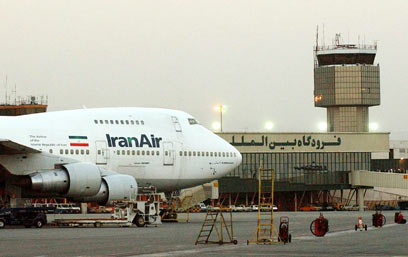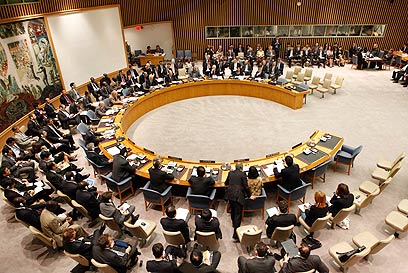
US expert: We must wage all-out financial war on Iran
Former Treasury official Avi Jorisch talks to Ynet about US' efforts to stifle Iran's economy and what is stopping Obama administration from taking more drastic measures
Speaking to Ynet, Jorisch, who served as a policy advisor at the Treasury Department's office of Terrorism and Financial Intelligence, said sanctions the US had independently imposed on Iran forbid private people, banks and international corporations from doing business with Iran in the energy field. The list, which includes more than 250 people and banks, is growing in accordance with directives issued by US President Barack Obama.
Related stories:
- Iran's ambassador to IAEA: Report unfounded
- Nasrallah warns of regional war if Iran, Syria attacked
- White House: IAEA report on Iran 'very alarming'
While US law bans these companies from conducting business with Iran, the reality is more complicated. According to Jorisch, who published a book detailing how Iran circumvents the sanctions, many American banks continue to hold economic ties with Iranian entities in a roundabout manner, mainly with the help of other banks around the world.

IranAir - can't refuel in Europe (Photo: AP)
Of the 30 existing banks in Iran, only four are subjected to the sanctions imposed by the UN Security Council, he said. The US has banned 20 of the 30 banks – those that are linked in one way or another to terror or the Iranian nuclear program, as well as those engaged in activity that is considered detrimental to peace.
Jorisch said there are less than 20 banks (based in Dubai, Russia, China and Europe) that do not conceal their business with Iran, adding that some Iranian banks operate openly through branches in London, Paris, Frankfurt, Hamburg, Moscow, Dubai, Malaysia and South Korea.
The Security Council has imposed four rounds of sanctions against Iran since 2006. The initial sanctions targeted the Islamic Republic's nuclear program, but later sanctions froze assets belonging to Iranian banks, restricted the operations of Iranian airlines and shipping companies and targeted firms and persons linked to the Revolutionary Guard, Iran's main military force which is in charge of the nuclear program along with the Defense Ministry.

Iranian rial at record low (Photo: AP)
Additional sanctions have been imposed independently by the US and the European Union. European Union companies are banned from cooperating with Iran in the banking, commerce, energy, and financial services fields. Washington and Brussels' efforts have been supported by other allies around the world, such as Canada, Australia and South Korea.
Ban effective but more possible
Sanctions against Iran have resulted in a growing unemployment rate, price hikes and difficulties in transferring money to other countries and in distributing gas and fuel to citizens. Recently the Iranian rial fell to a record low against the US dollar.
Jorisch said the American ban is effective, but does not completely stifle Iran's ability to conduct business around the world. He said it was very difficult – and much more expensive - for Iran to transfer money these days. Banks that deal with Iran charge higher rates and ask more questions, he added.
Jorisch said the US administration has been trying to convince international banks that their connections with Iran were bad for business. The House of Representatives recently passed a bill that would obligate the US Treasury to blacklist banks that trade, even indirectly, with Iran, he said, adding that the bill still requires the approval of the Senate and President Obama.

UN Security Council voting on sanctions in 2010 (Photo: Reuters)
Asked why such a bill was not initiated a long time ago, Jorisch said that because of the weak global economy, there is a fear that international banks would prefer the Iranian market over the American one. The US government, for its part, claims that the Iranian people must be allowed some breathing room, he said, adding that this course of action is making it easier for Iran to work on a nuclear bomb.
Jorisch claimed that the American administration did not ban Tehran's central bank for fear such a move would lead to a sharp rise in the price of oil and stir fear in the markets.
The former Treasury official said the US is currently examining ways to impose sanctions against Iran's oil and gas industry, without declaring so publicly so as not to cause prices to rise. The goal now, he said, was to encourage companies to leave the Iranian market.
Jorisch said that apart from sanctions, international community must consider waging a "financial war" against Iran. This, he said, would lead to an increase in oil prices, but "we must choose between paying now or paying much more later," after Iran obtains nuclear capabilities.
- Receive Ynetnews updates directly to your desktop










